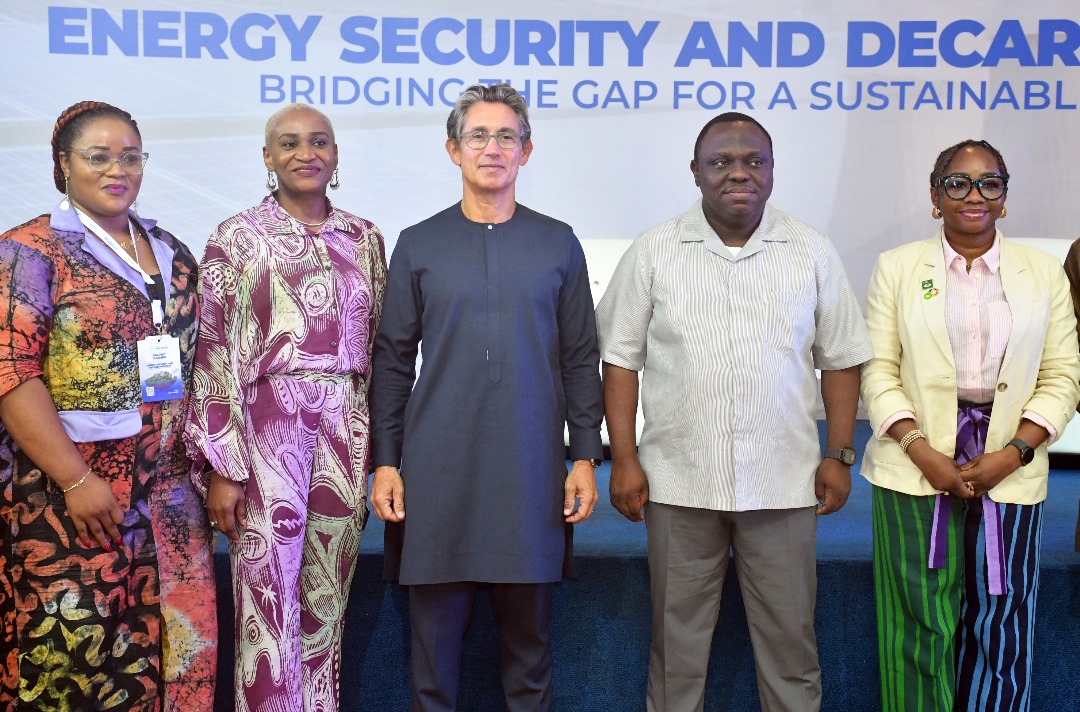By Rukayat Moisemhe
Stakeholders from the public and private sectors have emphasised the need for stronger collaboration on energy security and decarbonisation to accelerate Africa’s transition to clean energy and sustainable growth.
They said that the transition would deliver economic resilience, create jobs and promote sustainable industrialisation across the continent.
They spoke at the Private Sector Environmental, Social and Governance (ESG) forum with the theme: ” Energy Security and Decarbonisation: Bridging the Gap for a Sustainable Future”.
The Governor of Lagos State, Mr Babajide Sanwo-Olu, represented by Mrs Titilayo Oshodi, his Special Adviser on Climate Change and Circular Economy, said that climate action and economic growth must go hand-in-hand.
Sanwo-Olu said that in Lagos and by extension Nigeria and Africa, the conversation on ESG could not be well established without addressing its economic benefits.
The governor said that issues pertaining to environment, renewable energy, waste and water management were crucial to Lagos as an aquatic and coastal city.
He said that the event’s theme captured a vision that was both urgent and necessary as nations, industries and cities continued to navigate the complex transition toward low-carbon economy without compromising growth and energy access.
“As a megacity with over 20 million residents, our approach has been to integrate sustainability into governance through innovative programmes like the Eko-Circulate initiative, Let Lagos Breathe and Clean Stove Cook initiative, among others,” he said.
Sanwo-Olu described the private sector as not just a stakeholder but a key driver of the transformation.
He hoped that the ESG forum would spark collaborations that would turn policy into practice, uniting government, business and the civil society to co-create solutions to strengthen energy systems.
The governor affirmed his readiness to work with the private sector to build a future where growth would be sustainable, energy accessible, and the planet protected.
Mr Biodun Ogunleye, Lagos State Commissioner for Energy and Natural Resources, affirmed that the state was charting energy independence.
He said Lagos had an integrated energy policy and was actively trying to make it to be not just a sub national of note but a state that would become a leader for Africa as a city able to power itself sustainably.
Ogunleye added that Lagos had continued to demonstrate leadership on decarbonisation by actively moving from transitional fuel to more sustainable and definitive finer fuels.
He said that the state had continued to promote responsible energy use across public buildings and facilitate adoption of compressed natural gas.
“By next year, we would lay out a new master plan across the city that supports e-mobility and cleaner energy use for transportation.
“We know that government alone cannot achieve these, as they require collaboration, innovation and investment.
“The private sector remains indispensable with the capacity to scale solutions faster, and government would continue to provide regulatory environment, transparent investor-friendly oversight and support for businesses that show strong ESG performance,” he said.
Mr Yarub Al-Bahrani, Managing Director, British American Tobacco (BAT), West and Central Africa, said that balance was needed to power growing industries and homes on one hand, and to heal and nurture the planet on the other hand.
He said that energy consumption and production contributed approximately two-thirds of global emissions, with 81 per cent of the world’s energy still based on fossil fuels.
Al-Bahrani noted that within Africa, all fossil fuels accounted for about 90 per cent, with biofuels and waste making up a significant portion of the rest.
He added that nearly 600 million people on the continent were still without access to electricity, food security and water; hence, the importance of discussions around powering the continent’s growth without compromising the planet.
“This is where the private sector must step forward, not with rhetoric but with action, and at BAT Nigeria, we can not talk about decarbonisation without first walking the talk within our own value chain.
“We have demonstrated this commitment through a tangible and transformative journey underpinned by our sustainability strategy which is anchored on five impact areas.
“To achieve meaningful change and transformative impact requires the whole-of-society effort.
“Governments and regulators alongside private enterprise must engage in structured and transparent dialogue that spearheads timely, meaningful and collective action,” he said.
Mrs Tenioye Majekodunmi, Director-General, National Council on Climate Change (NCCC), noted the pivotal role of the private sector in shaping Africa’s sustainable future.
She said that Africa stood at the intersection of two urgent imperatives – expanding energy access and reducing carbon emissions.
She said that under the leadership of President Bola Tinubu, Nigeria remained unwavering in its commitment to a carbon-neutral economy as outlined in the country’s Energy Transition Plan.
She said that the mandate of the NCCC was clear – to ensure that Nigeria’s climate response was integrated, evidence-based and inclusive, balancing economic growth with environmental stewardship.
The director-general also said that the council was working to operationalise the Climate Change Act, which provides the legal and institutional framework for climate governance in Nigeria.
“Key components include the establishment of sectoral emission reduction targets and carbon budgets, creation of an emissions trading framework to attract green finance, and strengthened collaboration between government and private sectors.
“I urge business leaders to integrate ESG principles into corporate governance and strategic decision-making, invest in renewable and energy-efficient technologies and prioritise climate risk disclosure and resilient planning,” she said.
Majekodunmi also emphasised the need to forge partnerships necessary to bridge the gap for a sustainable future, turning Nigeria’s energy challenge into its greatest opportunity.
Mr Segun Ajayi-Kadri, Director-General, Manufacturers Association of Nigeria, said that the manufacturing sector faced significant challenges in accessing affordable and reliable energy.
He said that it was impacting competitiveness and productivity.
Ajayi-Kadri said that collaborative efforts, knowledge sharing and co-developed solutions were key to bridging the gap between private sector needs and sustainable energy transition.
“Our collective goal is to ensure that energy transition efforts deliver economic resilience, create jobs and promote sustainable industrialisation across the continent.
“As manufacturers, we are committed to playing our part in driving sustainable practices, reducing carbon footprints and contributing to a greener future,” he said. (NAN)(www.nannews.ng)
Edited by Ijeoma Popoola












